
Nature Synthesis
Scope & Guideline
Catalyzing Breakthroughs in Chemical Methodologies
Introduction
Aims and Scopes
- Synthetic Methodologies:
Focuses on the development of new synthetic pathways and techniques, including radical reactions, catalytic processes, and electrochemical methods. - Materials Chemistry:
Explores the synthesis and application of advanced materials, particularly nanomaterials, polymers, and metal-organic frameworks. - Biocatalysis and Green Chemistry:
Investigates biocatalytic processes and sustainable synthetic methods aimed at reducing environmental impact and improving efficiency. - Computational Chemistry and Machine Learning:
Utilizes computational approaches and machine learning to predict reaction outcomes, optimize synthesis routes, and guide experimental design. - Interdisciplinary Approaches:
Encourages the integration of chemistry with biology, materials science, and engineering to address complex synthetic challenges.
Trending and Emerging
- Electrochemical Synthesis:
An increasing number of articles focus on electrochemical methods for organic synthesis, highlighting their potential for sustainability and efficiency in converting renewable resources into valuable products. - Biocatalysis and Enzyme Engineering:
The application of engineered enzymes for synthetic purposes is gaining traction, with research emphasizing biocompatible processes that offer high specificity and reduced environmental impact. - Robotics and Automated Synthesis:
The integration of robotics and automation in synthesis is on the rise, facilitating high-throughput experimentation and advancing the field of synthetic chemistry through enhanced efficiency. - Sustainable and Green Chemistry:
There is a growing emphasis on sustainable practices and green chemistry principles, with research increasingly focusing on reducing waste and utilizing renewable feedstocks. - Computational Design and Machine Learning:
The utilization of computational methods and machine learning for predicting synthetic pathways and optimizing reaction conditions is becoming a critical area of research, enabling more efficient and targeted synthesis.
Declining or Waning
- Traditional Metal-Catalyzed Reactions:
While still relevant, there is a noticeable shift away from classical metal-catalyzed reactions in favor of more innovative and sustainable methods, such as electrochemical or photochemical approaches. - Single-Step Synthesis:
The focus on simplistic, single-step synthetic routes has waned, with a growing preference for multi-step processes that offer greater complexity and functionality. - Conventional Organic Synthesis Techniques:
Traditional organic synthesis methods are being overshadowed by advancements in automated and robotic synthesis, which offer higher throughput and efficiency. - Static Methods in Catalysis:
Static catalytic methods are becoming less favored compared to dynamic and adaptive approaches that allow for real-time optimization of reactions.
Similar Journals
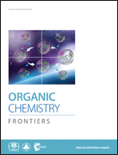
Organic Chemistry Frontiers
Pioneering pathways in organic chemistry excellence.Welcome to Organic Chemistry Frontiers, a premier academic journal published by the Royal Society of Chemistry, dedicated to advancing the field of organic chemistry. With an impressive Q1 ranking in the 2023 category of Organic Chemistry and a notable Scopus rank of 34 out of 211, this journal provides a vital platform for researchers and professionals to disseminate innovative research, cutting-edge methodologies, and comprehensive reviews. Serving as an open-access journal, Organic Chemistry Frontiers aims to enhance the visibility and accessibility of critical research findings in the organic chemistry domain, fostering collaboration and dialogue among scientists worldwide. Since its inception in 2014, it has consistently published high-quality articles that contribute to the progression of knowledge and application in organic chemistry, establishing itself as a cornerstone for students and scholars striving to deepen their understanding and drive forward their research endeavors.
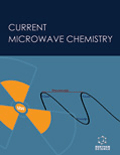
Current Microwave Chemistry
Exploring the Frontiers of Microwave-Assisted ChemistryCurrent Microwave Chemistry is a pioneering academic journal dedicated to the dynamic and rapidly evolving field of microwave-assisted chemistry. Published by Bentham Science Publishers Ltd, this journal aims to disseminate high-quality research that explores innovative methodologies, novel applications, and the fundamental principles underlying microwave technology in chemical processes. Offering a platform for researchers, professionals, and students, Current Microwave Chemistry plays a crucial role in enhancing the understanding and application of microwave chemistry across disciplines such as synthetic chemistry, materials science, and pharmaceutical research. By facilitating open access to groundbreaking studies, this journal encourages collaboration and knowledge exchange, positioning itself as an essential resource for those looking to push the boundaries of what is achievable in chemical science.
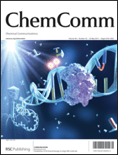
CHEMICAL COMMUNICATIONS
Connecting researchers through groundbreaking discoveries.Chemical Communications, published by the esteemed Royal Society of Chemistry, is a prominent journal within the field of chemical science, focusing on the dissemination of cutting-edge research in a variety of sub-disciplines including catalysis, materials chemistry, and electronic materials. Operating without an open access model, this journal provides critical insights from contributors around the globe, enhancing our understanding of complex chemical interactions and innovative applications. Ranked in the top quartile for several categories such as Ceramics and Composites, and Metals and Alloys, Chemical Communications boasts impressive Scopus rankings, securing strong positions across multiple fields and showcasing its influence within the scientific community. The journal is committed to advancing knowledge and fostering collaboration among researchers, professionals, and students, making it an invaluable resource for those looking to stay abreast of the latest advancements in chemistry and materials science. With a publication history dating back to 1965 and continuing into 2024, its rich archive serves as a vital repository of chemical research and development.
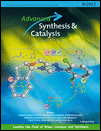
ADVANCED SYNTHESIS & CATALYSIS
Empowering researchers to transform chemical processes.ADVANCED SYNTHESIS & CATALYSIS is a prestigious academic journal published by Wiley-VCH Verlag GmbH, based in Germany. This journal, with ISSN 1615-4150 and E-ISSN 1615-4169, plays a pivotal role in the fields of Chemistry and Chemical Engineering, earning commendable rankings such as Q2 in Catalysis and Q1 in Organic Chemistry in 2023. Its high impact factor and recognition—ranking #18 in both Organic Chemistry and Catalysis—further underscore its significance as a platform for groundbreaking research and innovative methodologies. Spanning from 1996 through 2024, ADVANCED SYNTHESIS & CATALYSIS aims to disseminate high-quality, cutting-edge studies related to synthetic processes and catalytic technologies, ensuring accessibility via their open access options. By fostering a vibrant scholarly community, this journal serves as an essential resource for researchers, professionals, and students dedicated to driving advancements in synthetic and catalytic chemistry.
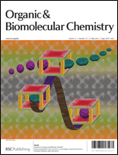
ORGANIC & BIOMOLECULAR CHEMISTRY
Connecting researchers through high-quality, open-access studies.ORGANIC & BIOMOLECULAR CHEMISTRY is a prestigious academic journal published by the Royal Society of Chemistry, dedicated to advancing the fields of organic and biomolecular chemistry. With its ISSN of 1477-0520 and E-ISSN of 1477-0539, this journal plays a pivotal role in disseminating high-quality research and contributing to the scientific community, particularly in biochemistry, organic chemistry, and physical and theoretical chemistry. Currently ranked in the third quartile for Biochemistry and the second quartile for Organic Chemistry and Physical and Theoretical Chemistry, it caters to a diverse audience of researchers, professionals, and students who seek insightful studies and reviews. With a publication history spanning since 2003 and ongoing till 2024, the journal fosters open access to its articles, encouraging the free exchange of knowledge. Situated in the vibrant academic environment of Cambridge, UK, ORGANIC & BIOMOLECULAR CHEMISTRY serves as a vital resource for innovative research at the intersection of chemical sciences.

ARKIVOC
Championing Open Science in Organic ChemistryARKIVOC is an esteemed open-access journal dedicated to the field of Organic Chemistry, published by ARKAT USA INC. Since its inception in 2000, ARKIVOC has aimed to disseminate high-quality research and advancements in organic chemistry, fostering an international exchange of knowledge within this ever-evolving discipline. With its ISSN 1551-7004 and E-ISSN 1551-7012, the journal is committed to providing accessible content free of charge to researchers, students, and professionals around the globe. Although currently categorized in the fourth quartile of Organic Chemistry with a Scopus rank of #188 out of 211, ARKIVOC continues to encourage the publication of innovative works and critical reviews that highlight emerging trends and methodologies in organic synthesis, reaction mechanisms, and material sciences. Its open-access model since 2000 ensures that valuable contributions to scientific knowledge are widely available, promoting collaboration and discovery. The journal is based in the United States, with its editorial office located at the University of Florida, under the guidance of prominent chemists. ARKIVOC provides an essential platform for those deeply engaged in organic chemistry research, supporting the advancement of science for future generations.
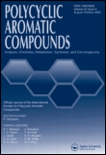
POLYCYCLIC AROMATIC COMPOUNDS
Unraveling the Intricacies of Aromatic StructuresPOLYCYCLIC AROMATIC COMPOUNDS, published by TAYLOR & FRANCIS LTD, is a pivotal journal dedicated to the study of polycyclic aromatic compounds, which play a significant role in fields spanning materials chemistry, organic chemistry, and polymers. With an ISSN of 1040-6638 and an E-ISSN of 1563-5333, this journal features a robust collection of research that informs and guides advancements in understanding the complex interactions and applications of these compounds. Having established its presence since 1990, POLYCYCLIC AROMATIC COMPOUNDS currently holds a Q3 ranking in multiple categories, including Materials Chemistry, Polymers and Plastics, and Organic Chemistry, showcasing its consistent contributions to scientific dialogues. Though traditionally not an open access journal, it provides immense value to researchers, professionals, and students seeking reliable and impactful studies. The journal is located in the United Kingdom at 2-4 PARK SQUARE, MILTON PARK, ABINGDON OR14 4RN, OXON, ENGLAND, and continues to be a trusted source for cutting-edge research in the field.
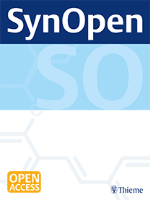
SynOpen
Advancing Knowledge Across DisciplinesSynOpen is an esteemed open-access journal published by GEORG THIEME VERLAG KG, based in Germany, dedicated to advancing the fields of Biomaterials, Catalysis, Materials Science, and Organic Chemistry. Since its inception in 2017, the journal has established itself as a vital platform for researchers wishing to disseminate their findings in a rapidly evolving scientific landscape, earning a commendable Q2 ranking in Materials Science (miscellaneous) and Q3 in other key categories for 2023. With an increasing impact on its disciplines, SynOpen aims to foster interdisciplinary collaboration and innovation by providing unrestricted access to high-quality research, thus promoting a broader reach and visibility for authors. Scholars, professionals, and students alike can benefit from the comprehensive range of topics covered, as the journal's commitment to presenting cutting-edge studies and methodologies positions it as a crucial resource for contemporary scientific inquiry.
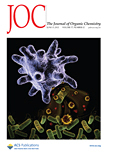
JOURNAL OF ORGANIC CHEMISTRY
Elevating Research Standards in Organic ChemistryJournal of Organic Chemistry, published by the American Chemical Society, is a prestigious peer-reviewed journal dedicated to advancing the field of organic chemistry. With an ISSN of 0022-3263 and an E-ISSN of 1520-6904, this journal has established itself as a key platform for disseminating high-quality research since its inception in 1936. Residing in the Q2 category for Organic Chemistry as of 2023, it ranks #64 out of 211 in Scopus, positioning itself within the top 69th percentile of its field. Researchers and professionals can access vital findings and innovative methodologies that drive the understanding and application of organic chemical principles. Although the journal is not open access, it remains a crucial resource in academia and industry, contributing significantly to the scientific community's knowledge base. For detailed insights and cutting-edge research, the journal continues to be an essential read for those engaged in the dynamic and evolving landscape of organic chemistry.
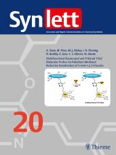
SYNLETT
Advancing the Frontiers of Organic SynthesisSYNLETT is a prominent academic journal dedicated to the field of Organic Chemistry, published by GEORG THIEME VERLAG KG. Since its inception in 1989, the journal has played a critical role in advancing the understanding of synthetic methodologies and organic compounds, offering a platform for innovative research and discoveries. With an ISSN of 0936-5214 and an E-ISSN of 1437-2096, SYNLETT is well-regarded in the academic community, presently positioned in the Q3 quartile for Organic Chemistry according to the 2023 category rankings. The journal is particularly valuable for researchers and professionals seeking insights into contemporary organic synthesis methods and their applications. Although it does not operate under an Open Access model, it remains a crucial resource within the field, contributing to significant advancements and collaborations globally. For those engaged in organic synthesis, SYNLETT not only encapsulates cutting-edge research but also inspires innovation in the discipline.